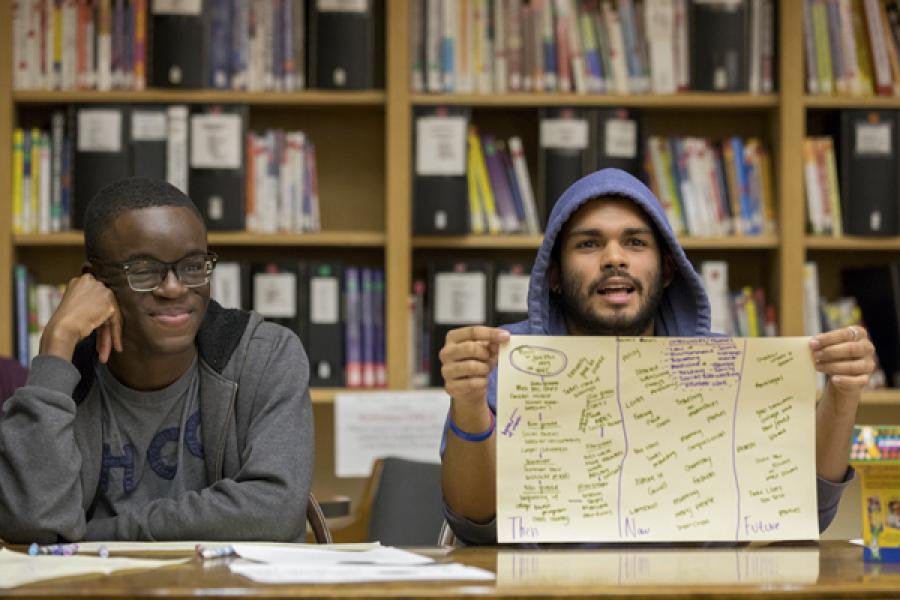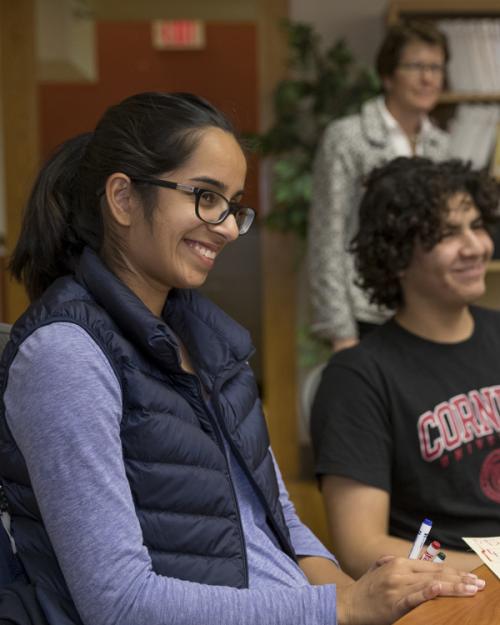When Hermis Reyes ’21 was wondering what classes to take next semester, he sat down for a chat with his adviser, Gretchen Ritter, who also happens to be the Harold Tanner Dean of the College of Arts & Sciences.
That Ritter would have time for a lengthy chat with a freshman doesn’t seem unusual for Reyes because he and nine other freshmen get to see her every week as part of a new pilot program in the College of Arts & Sciences that pairs new students with senior faculty and staff for small group meetings.
“I know more about these 10 people than I know about my regular advisees because we’ve been able to spend so much time together,” said Ravi Ramakrishna, professor of mathematics, Stephen H. Weiss Presidential Fellow and department chair. The group’s weekly meetings focus on topics such as time management, the value of the liberal arts curriculum opportunities and navigating Cornell and all of its resources.
“The feedback we’ve received from the seminar students so far has been overwhelmingly positive,” said Bonnie Comella, director of advising for the college and another small group leader. “They understand the value of studying in Arts & Sciences, are more aware of the support services available to them, and know that their advisor is invested in their academic success. In turn, the advisors find this advising format incredibly rewarding. It’s a win-win for all of us.”
On a recent Monday, students in Ramakrishna’s and Ritter’s sections visited the college’s Career Development Center for an introduction to the center’s offerings and an exercise called a “wandering map,” which asked students to think about people, places, jobs, honors, courses and other life events and ideas that have been important to them or that interest them, in the past, present and future.
“This is a great way to brainstorm ways of viewing your past experiences, hoping to identify some themes and threads in your journey so far,” said Ana Adinolfi, senior career associate. “We want you to break away from linear thinking and just envision your future and get excited about all of the possibilities.”
Students chose markers to work on 11 by 17 inch pieces of paper, some using creative lettering and drawings to represent their interests and others organizing their thoughts into bullet point lists.
“These are the things that I absolutely loved in high school,” Pallavi Kenkare ‘21 said as she showed her map, which indicated a variety of interests in everything from painting and drawing to science, law and literature.
Yanni Ramirez ’21 organized his map in terms of hobbies, events that have impacted him and classes and topic that he’s excited to study. He said his interests are also broad, so having a close connection to Ramakrishna has been a benefit.
“It’s really helped me when I can talk to Ravi about my future and what I might want to study, because I’m not sure yet,” said Ramirez, who came to Cornell from Los Angeles.
Reyes is also undecided about what to major in. He had great high school experiences in Manhattan related to law, but he’s also always been good at science and feels strongly about environmental issues.
“I was talking to Dean Ritter about my potential schedule because I want to dip into bio next semester, but I also enjoyed my government classes,” he said. “She suggested a bio course related to the environment because she saw my interests there. Being with the dean, she has access to a lot of information and knows a lot about the courses.”
“Educating these talented young people is one of the great contributions we make to the world,” Ritter said. “This program is an effort to get our freshmen off to a good start here.”
During the next class session, Ramakrishna encouraged students to broaden their horizons when they pre-enroll for the spring semester, making time for engaged learning experiences and classes outside their main area of interest. He also encouraged them to start thinking about study abroad and research.
“We’re really delighted by the positive feedback from both the students and the faculty involved in the seminar,” said Rachel Bean, senior associate dean for undergraduate education, professor in the Department of Astronomy and another small group leader. “Next semester we’ll be working with faculty and students on how we can extend on this first pilot, to involve more of our future freshman, and help them create early, stronger connections with faculty and resources across our campus.”





